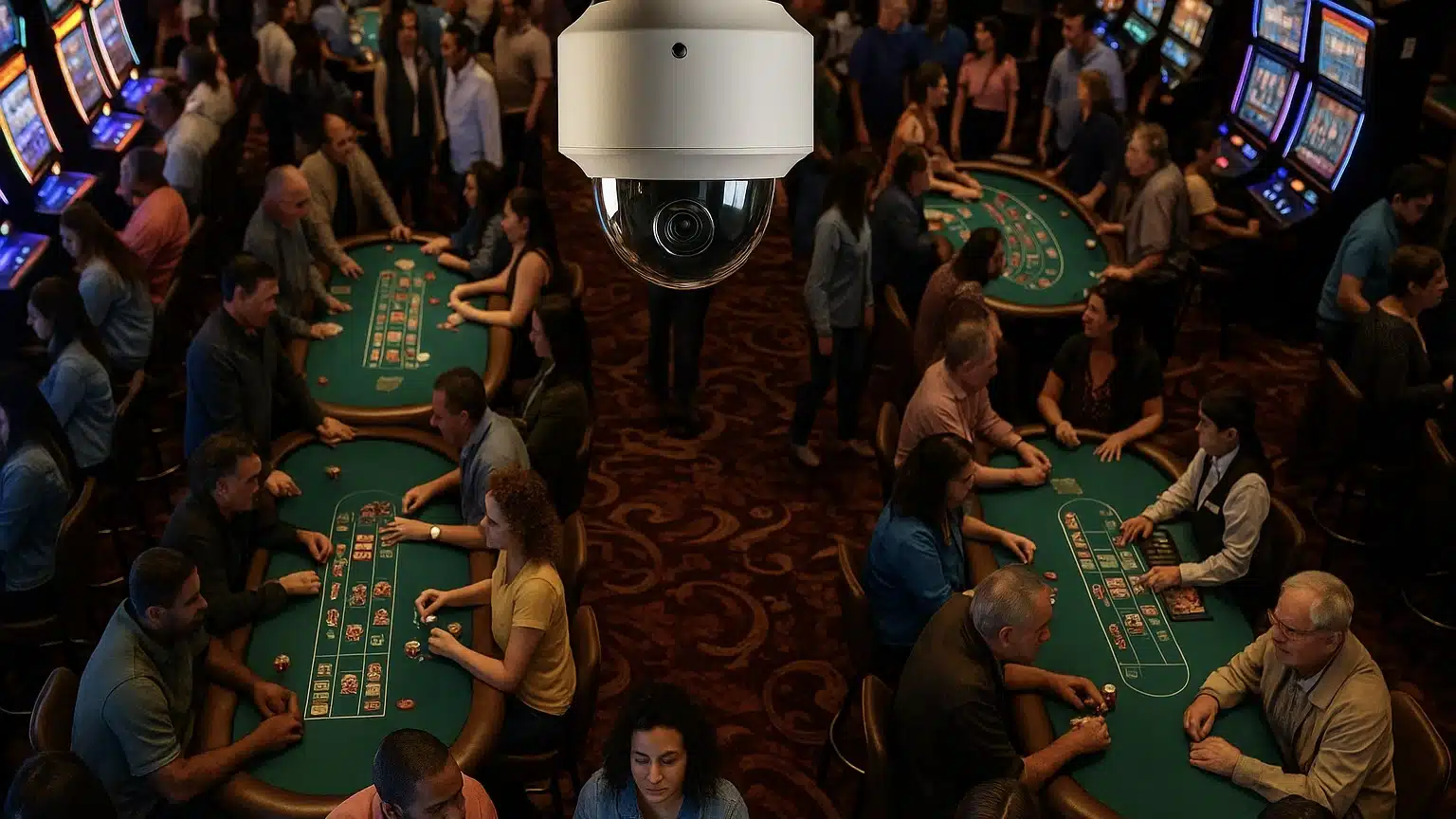Casinos are an industry unlike any other. They typically operate at all hours without closure, store large amounts of cash on their premises, and are almost always busy. With alcohol being served, unpredictable behavior can occur and cause conflicts to escalate. This can make casinos an easy target for various criminal activities, including theft, fraud, and even gun violence.
Casinos can combat this with robust security systems that are designed to keep patrons and staff safe and protect assets.
This article will look at the technologies and protocols casinos use to prevent theft, fraud, and other criminal activity. From advanced surveillance to trained security personnel, find out how casinos create a safe environment.
Key Takeaways
- The casino industry has complex security challenges that require attention, care, and detail to be addressed.
- Casino security systems should be multi-layered, including both trained staff and advanced technology in operations. Technology can cover the blind spots people miss, and security teams can provide human insight and interventions that technology simply can’t.
- Regular upgrades, ongoing staff training, and collaboration with law enforcement are essential best practices for maintaining effective casino security.
Casino Security Vulnerabilities

Casinos are filled with slot machines, gaming tables, and often elaborate structures, which can create visual blind spots that hinder surveillance. The movement of patrons and the high volume of transactions make it hard for security to monitor every corner, entrance, and exit. While casino security may seem focused on protecting the casino and its assets, security protocols also focus on protecting customers from physical threats. In this regard, vigilant monitoring of high risk areas and implementing robust measures to keep them safe is key to security.
Casino security personnel must combine advanced technology and security protocols to build a multi-layered approach to addressing these unique security challenges.
Specific challenges can be identified through risk assessments. These can help identify any areas that are lacking in security, are higher risk, or have a history of incidents. When done regularly, they can help to ensure that any new threats can be addressed proactively.
Casino Security Objectives
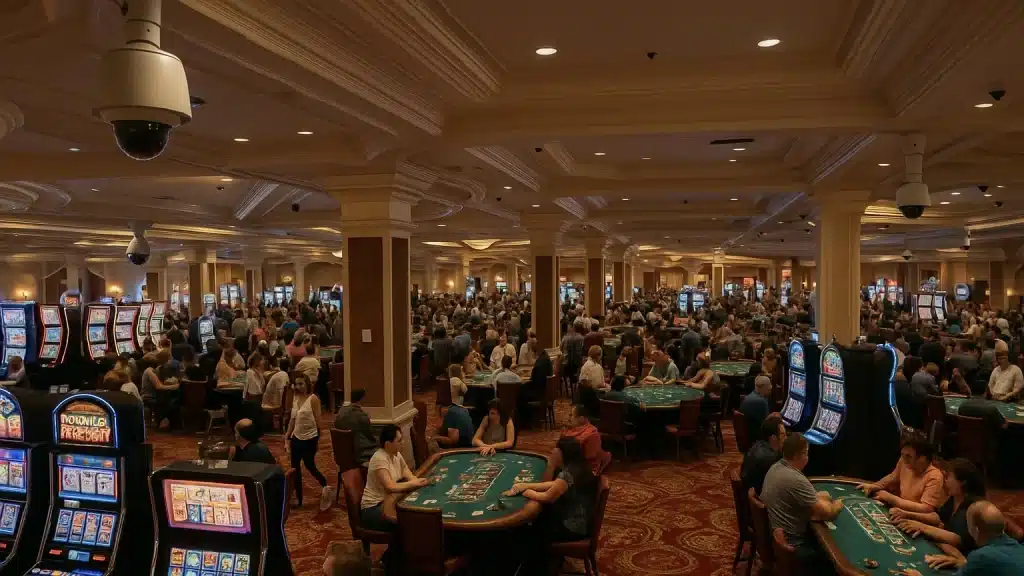
Managing Large Crowds
Managing large crowds is a major challenge in casinos, especially during peak hours when there are more patrons and big cash transactions. Advanced surveillance technologies can help security teams oversee larger groups, so no unusual activities go unnoticed.
By focusing on accurate monitoring, casinos can reduce the risk of incidents for a safer environment for guests and staff.
Preventing Theft and Fraud
Preventing theft and fraud is important, as casinos are at a greater risk of these due to their high cash volumes. Various technologies and tools can be used to combat theft and fraud:
- Card shuffling machines
- Chip RFID technology to maintain game integrity
- Advanced anti-fraud software tools that analyze betting patterns to detect unusual activities.
These help create a safe environment, prevent financial losses, and ensure fair play and anti-money laundering compliance.
Staff and Guest Safety
Staff and guest safety is the top priority in casino security. Communication with security teams, staff, and casino guests is key to successful security operations. Additionally, regular communication with local law enforcement can help to achieve a quick response to any incident.
Regular training for security staff helps them to recognize, prevent, and respond to security incidents for a safe environment for all.
Components of a Casino Security System
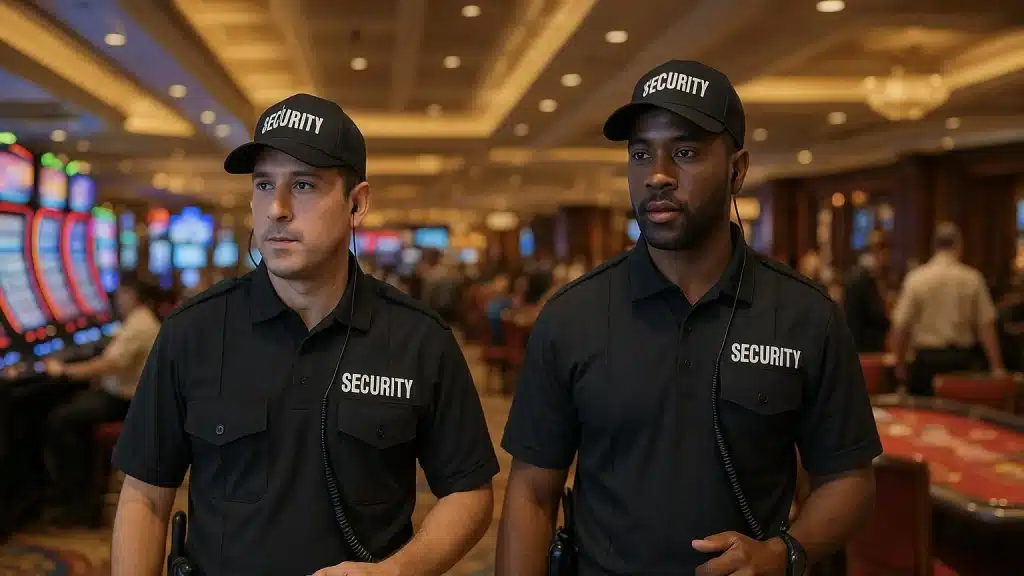
Every casino security system should have many components that each play a role in safety. These include high-definition cameras enhanced with AI, access control systems, alarm systems, and trained security personnel. By combining these, casinos can create a security framework that addresses all threats and vulnerabilities.
Below are the details of each component, with their importance in the overall security strategy.
Security Guards
Security guards have a special role to play in the casino environment. They deter potential criminals and give guests and staff a sense of security. Trained security guards play a key role in keeping the environment secure by:
- Watching patrons.
- Recognizing patterns of behavior that indicate suspicious activity.
- Intervening when needed.
This is the first line of defense against potential threats. By using human observation skills and communication systems, security guards can spot suspicious behavior and respond quickly in an emergency.
Trained security guards can also de-escalate a criminal or aggressive situation safely and get to a swift resolution before it escalates. Training should be ongoing to ensure that they can respond to any situation, keeping the environment secure and accounting for every person.
High-Definition Cameras and AI-Enhanced Cameras
High-quality camera surveillance is critical in casino security, providing clear and detailed footage. Cameras that enable effective monitoring by providing high-quality images, videos, and even real-time detection of weapons, like firearms, are ideal for spaces as large and complex as casinos.
Real-time monitoring using artificial intelligence (AI) is a game-changer for casino security camera systems. It allows for immediate threat detection, sending alerts to security, and enabling a quick response to incidents.
When integrated into security cameras, AI-powered analytics can provide 24/7 intelligent monitoring, reducing personnel fatigue. This makes overall security measures more effective because security can focus on real threats and false alarms can be reduced. Some AI software can be integrated into a casino’s existing surveillance system, adding to its ease of use and lowering the initial costs of implementation.
Access Control
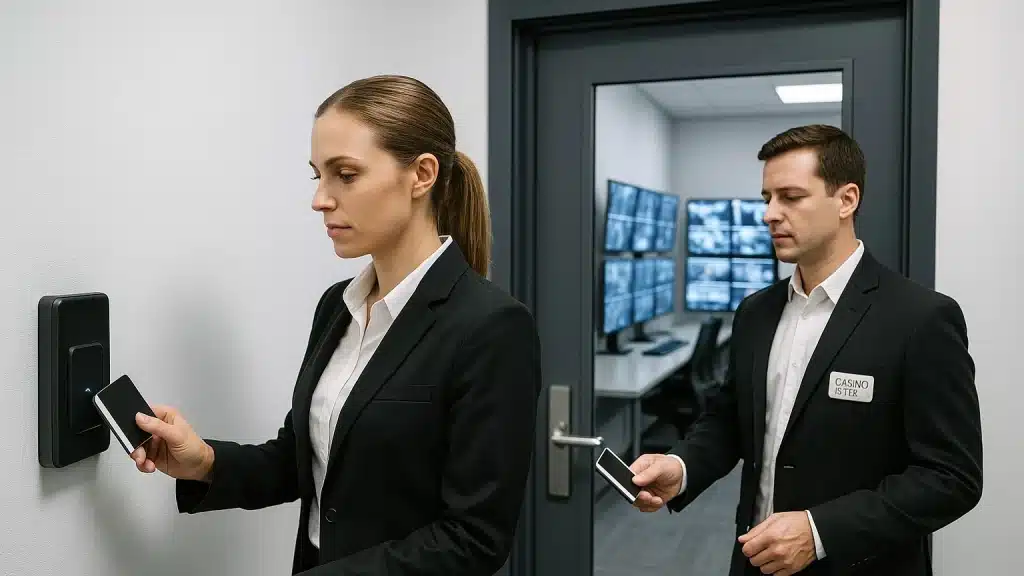
Access control systems are critical to casino security operations by ensuring only authorized people can enter restricted areas. These can use advanced technologies like biometric scanners and keycard entry to manage and restrict access, protecting assets and personnel.
Alarm Systems
Alarms in casinos can help to improve response times by security personnel and law enforcement. Audible and visual alarms can be useful for communicating with patrons and staff in a variety of emergency scenarios. This can potentially improve response times by increasing the public’s awareness and compliance. Alarms may also assist in deterring threats, causing those attempting to enter secure areas to abandon them.
Silent alarms can also be very helpful by sending alerts to personnel and responders, allowing them to address incidents efficiently and discreetly. When a gun is detected and verified, for example, casinos can trigger automated responses, like locking access points and contacting law enforcement, within seconds.
Emergency Response Protocols
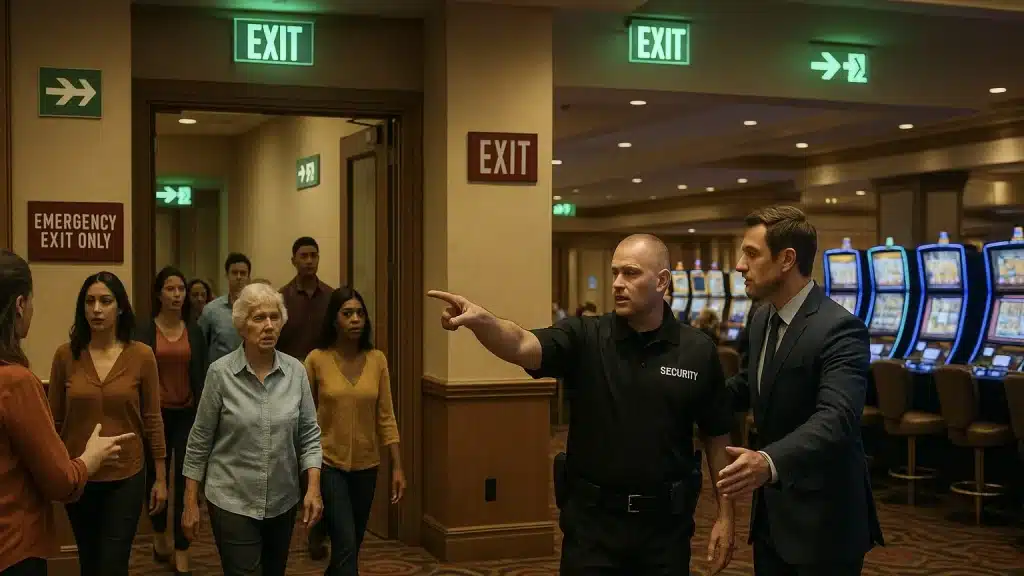
Having emergency response protocols in place is crucial for casinos to react quickly and effectively to incidents. Whether it’s suspicious activity, theft, or a more serious threat, casinos must be able to act fast to protect guests and staff. A full emergency response plan should outline:
- Emergency response and first aid training for security personnel and casino staff
- Accessible emergency response equipment
- Emergency evacuation plans
- Incident reporting systems
- Mass communication plans
- Established collaboration with local law enforcement agencies
Security personnel are the ones who execute these protocols. They need to be trained to recognize an incident, respond accordingly, and coordinate with first responders. Essential equipment, like defibrillators, fire extinguishers, and emergency communications systems, should be readily available throughout the casino. Regular drills and training exercises ensure all security staff are familiar with emergency procedures and can keep the environment secure, even under pressure.
Casinos should have a system for reporting incidents and conducting thorough investigations to prevent future occurrences and improve security. By being prepared for emergencies, casinos can mitigate their impact and keep their customers safe.
Casino Security Regulations
Casino security is governed by a complex web of regulations. There are limited federal regulations for physical security. Minimum surveillance requirements for tribal casinos are outlined in 25 CFR § 542.23 by the National Indian Gaming Commission (NIGC), but most national laws and regulations focus on the financial security side of casinos to prevent things like money laundering and tax evasion. Most physical security regulations are state and casino-specific.
For example, the state of Nevada (which has more casinos than any other state) has regulations detailed in the “Surveillance Standards for Non-Restricted Licensees” that require every casino to document its security plans and establish specific surveillance requirements to ensure security. For example, it outlines requirements for camera placements at certain games and spaces. Individual casinos often have internal security requirements for licensing and background checks to ensure that all operators and employees are vetted.
To stay secure and keep their licenses, casinos must demonstrate compliance. This means having robust systems to detect and prevent theft, fraud, money laundering, and violence. Audits and inspections are common, and noncompliance can result in big fines or even closure. By complying with these regulations, casinos not only protect themselves but also the guests and their wider community.
Security Budgeting and Resource Allocation
A good security budget is the foundation of any casino security plan. Casinos must allocate resources wisely to cover everything, from state-of-the-art surveillance systems to hiring and training security personnel. Budgets should also account for ongoing maintenance, upgrades, and new technology to stay ahead of threats.
Resource allocation starts with a risk assessment, identifying the unique challenges each casino faces. Funds should be set aside for emergency response protocols, first responder training, and equipment. Investing in systems to detect suspicious activity and prevent theft and violence is necessary for protecting guests, employees, and the large amounts of money that flow through the casino daily.
By spending in the areas that have the biggest impact—surveillance coverage, staff training, emergency response, and anti-fraud software—casinos can create a secure environment that deters criminal activity and keeps everyone on the premises safe. Budgeting effectively not only helps prevent losses but also shows that casinos care about their guests and staff, reinforcing the casino’s reputation as a safe and responsible entertainment venue.
Best Practices for Casino Security Systems
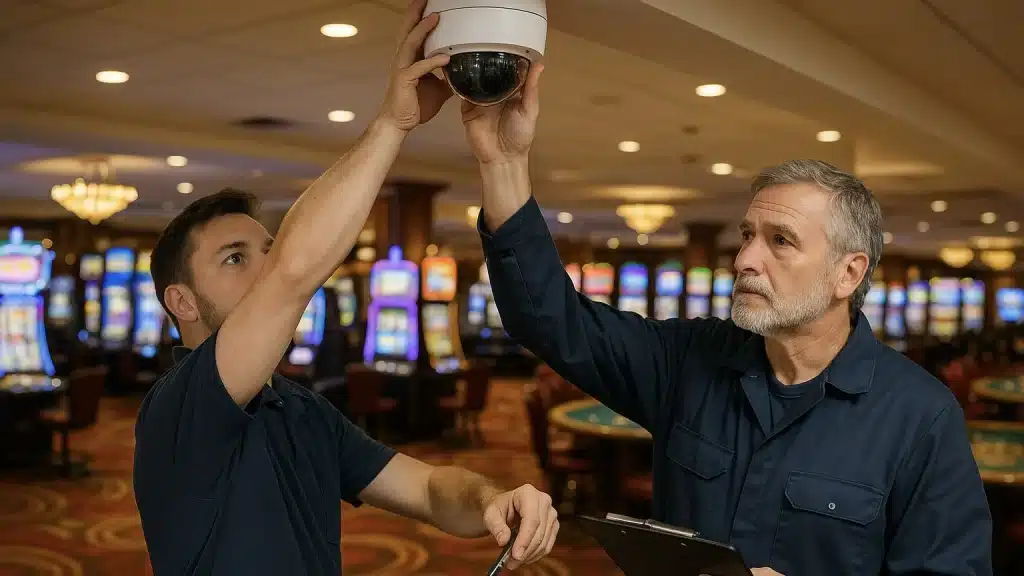
To be secure, casinos need to have a comprehensive security framework that combines technology and personnel training. This includes having regular system updates, staff training programs, and working with local law enforcement. Below are the best practices, a roadmap for implementing security in casinos.
- Regular System Updates and Maintenance: Keeping all security systems updated and in good condition is key to a safe casino environment. Ensuring everything is up to date means that emerging threats can be addressed proactively and all regulatory requirements can be met. By updating software and hardware, casinos can improve security and help protect against new threats.
- Continuous Staff Training: Ongoing training for security staff is necessary to keep them up to date with best practices and new technology. Continuous education enables security staff to be knowledgeable in the latest ways to manage threats.
- Involving Law Enforcement: Working with local law enforcement is very important for casinos to be secure and to respond quickly to incidents. Strong partnerships and communication between security and law enforcement can result in better overall safety and crime prevention in casinos.
- Sharing Intelligence and Industry Collaboration: Collaboration and intelligence sharing are essential for modern casino security. By working together, casinos and law enforcement can combat threats and emergencies. Sharing information on known offenders, suspicious activity, and emerging risks allows casinos to stay ahead of the game and protect patrons and staff. By participating in industry forums and security networks, casinos can share knowledge, coordinate responses to incidents, and raise the bar on security across the industry.
Casino security requires a multi-faceted approach that includes technology, people, and partnerships. By fixing vulnerabilities, implementing comprehensive surveillance, and following best practices, casinos can create a safe environment for guests and staff. Continuous improvement and adaptation to new threats are an essential part of casino security. With the right measures in place, casinos can be a safe and enjoyable place for all visitors.
Omnilert offers a wide range of security solutions for casinos and gaming environments. With a strong understanding of the unique vulnerabilities casinos have, Omnilert aims to address these proactively, integrating with existing systems and enhancing overall safety.
Frequently Asked Questions (FAQs)
Why do casinos have unique security risks?
Casinos operate in a unique threat environment. They each have complex layouts, are very busy and filled with crowds, are often open 24/7, and hold large sums of money. Additionally, things can be tense, and alcohol is served, which can contribute to the development and escalation of conflicts. This combination requires specialized and adaptive security to mitigate risks.
What technologies do casinos use to prevent crime?
Casinos utilize various technologies, including chip RFID technology, advanced anti-fraud software that analyzes betting patterns to detect unusual activities like card counting, and AI-enhanced surveillance technology to prevent crime.
What are the key components of a comprehensive casino security system?
A comprehensive casino security system typically includes high-definition and AI-enhanced cameras, access control systems, alarm systems, and trained security personnel. Risk assessment should be completed to determine which aspects of security are weakest and to identify any vulnerabilities.
What technologies do casinos use to prevent crime?
Casinos utilize various technologies, including chip RFID technology, advanced anti-fraud software that analyzes betting patterns to detect unusual activities like card counting, and AI-enhanced surveillance technology to prevent crime.
What are the key components of a comprehensive casino security system?
A comprehensive casino security system typically includes high-definition and AI-enhanced cameras, access control systems, alarm systems, and trained security personnel. Risk assessment should be completed to determine which aspects of security are weakest and to identify any vulnerabilities.
